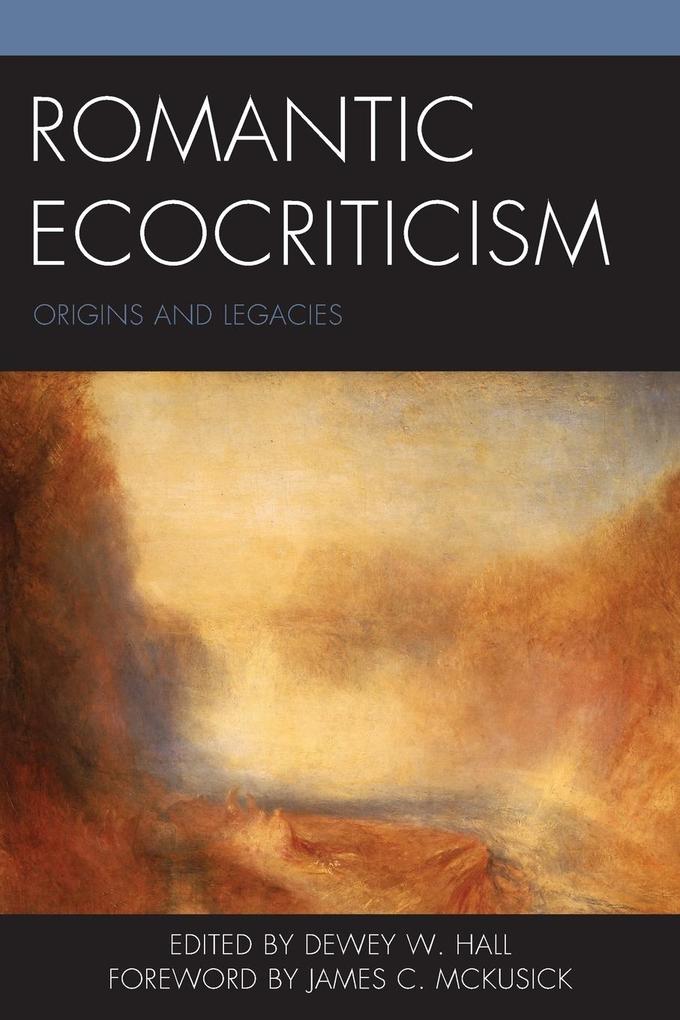
Zustellung: Mo, 28.04. - Fr, 02.05.
Versand in 6 Tagen
VersandkostenfreiBestellen & in Filiale abholen:
This book examines the influence of the science of the age upon a host of English and American authors. The collection develops transhistorical and transnational perspectives to examine the invaluable place of Romantic literary studies as inspiration behind the rise of early environmentalism in the nineteenth century and its subsequent legacies.
Inhaltsverzeichnis
Introduction - Dewey W. Hall
Chapter 1. Ecological Horology: The Nature of Time during the Romantic Period - Marcus Tomalin
Chapter 2. Naturalists' Interpretations: Daffodils, Swallows, and a Floating Island - Dewey W. Hall
Chapter 3. 'It cannot be a sin to seek to save an earth-born being': Radical Ecotheology in
Byron's Heaven and Earth - J. Andrew Hubbell
Chapter 4. Process and Presence: Geological Influence and Innovation in Shelley's 'Mont Blanc' - Bryon Williams
Chapter 5. 'Perpetual Analogies' and 'Occult Harmonies': Ralph Waldo Emerson's Ecological Selves - Kaitlin Mondello
Chapter 6. An Uncertain Spirit of an Unstable Place: Frankenstein in the Anthropocene - Shalon Noble
Chapter 7. Wild West and Western Wildness: A Transatlantic Perspective - Jude Frodyma
Chapter 8. Ecocentering the Self: William Howitt, Thoreau, and the Environmental Imagination - Ryan David Leack
Chapter 9. Toward a Romantic Poetics of Acknowledgement: Wordsworth, Clare, and Aldo Leopold's 'Land Ethic' - Gary Harrison
Chapter 10. Small is Beautiful: Rethinking Localism from Wordsworth to Eliot - Alicia Carroll
Chapter 11. Byron's Flower Power: Ecology and Effeminacy in Sardanapalus - Colin Carman
Chapter 12. The Miseducation of Chris McCandless: Romanticism, Reading, and Environmental Education - Lisa Ottum
Chapter 1. Ecological Horology: The Nature of Time during the Romantic Period - Marcus Tomalin
Chapter 2. Naturalists' Interpretations: Daffodils, Swallows, and a Floating Island - Dewey W. Hall
Chapter 3. 'It cannot be a sin to seek to save an earth-born being': Radical Ecotheology in
Byron's Heaven and Earth - J. Andrew Hubbell
Chapter 4. Process and Presence: Geological Influence and Innovation in Shelley's 'Mont Blanc' - Bryon Williams
Chapter 5. 'Perpetual Analogies' and 'Occult Harmonies': Ralph Waldo Emerson's Ecological Selves - Kaitlin Mondello
Chapter 6. An Uncertain Spirit of an Unstable Place: Frankenstein in the Anthropocene - Shalon Noble
Chapter 7. Wild West and Western Wildness: A Transatlantic Perspective - Jude Frodyma
Chapter 8. Ecocentering the Self: William Howitt, Thoreau, and the Environmental Imagination - Ryan David Leack
Chapter 9. Toward a Romantic Poetics of Acknowledgement: Wordsworth, Clare, and Aldo Leopold's 'Land Ethic' - Gary Harrison
Chapter 10. Small is Beautiful: Rethinking Localism from Wordsworth to Eliot - Alicia Carroll
Chapter 11. Byron's Flower Power: Ecology and Effeminacy in Sardanapalus - Colin Carman
Chapter 12. The Miseducation of Chris McCandless: Romanticism, Reading, and Environmental Education - Lisa Ottum
Mehr aus dieser Reihe
Produktdetails
Erscheinungsdatum
11. September 2017
Sprache
englisch
Seitenanzahl
312
Reihe
Ecocritical Theory and Practice
Herausgegeben von
Dewey W. Hall
Verlag/Hersteller
Produktart
kartoniert
Gewicht
509 g
Größe (L/B/H)
229/152/18 mm
ISBN
9781498518031
Entdecken Sie mehr
Bewertungen
0 Bewertungen
Es wurden noch keine Bewertungen abgegeben. Schreiben Sie die erste Bewertung zu "Romantic Ecocriticism" und helfen Sie damit anderen bei der Kaufentscheidung.

































